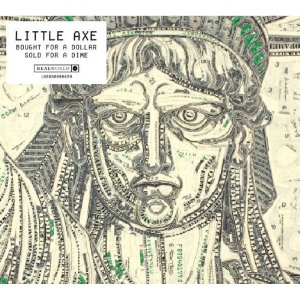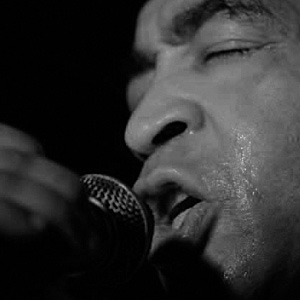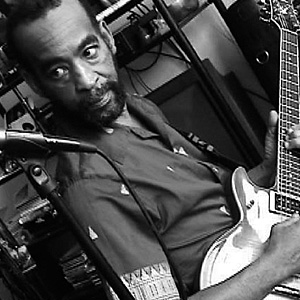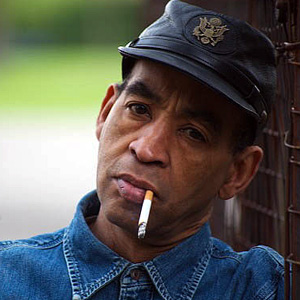Little Axe: New LP
 Little Axe - Bought For A Dollar, Sold For A Dime (Real World Recordings)
Little Axe - Bought For A Dollar, Sold For A Dime (Real World Recordings)
SKIP MCDONALD ÍS LITTLE AXE
Providing guitars, bass, keyboards, and vocals, Little Axe is the return to the blues that Skip grew up with and learned from his father. Born Bernard Alexander on 1 September 1949, Dayton, Ohio in the USA. Skip McDonald learned to play the blues on his father’s guitar from the age of 8, although by the time he was 12 years old he had opted to perform doo-wop.
But from picking up a guitar as a child, and returning to his roots with Little Axe, there has been a long twisting road. McDonald, along with bassplayer Doug Wimbish and drummer Keith LeBlanc formed the house band for the pioneering rap label Sugar Hill, providing the music for some of the most seminal records of the era by Grandmaster Flash, Afrika Bambaata, Force M.D.’s and others. From there he worked closely with Adrian Sherwood on many of projects for the On-U Sound label, as well as spearheading the band Tackhead and working with Living Colour.
Having completed his high school education Skip left Dayton with a band called the Ohio Hustlers, which broke up not long after relocating to New York City. His first professional work as a musician began when he formed the Entertainers who toured the east coast through to the mid-70s.
He moved on to Hartford, Connecticut, and there’s when he met Doug Wimbish, who played in a band called Wood, Brass & Steel. Wood, Brass & Steel recorded a selftitled album for All Platinum Records, the label of Sylvia and Joe Robinson, in 1976. Skip and Doug played a lot of music together, in clubs and colleges around New York, New Jersey, Connecticut and Massachusetts.
In 1979, three years after the Wood, Brass & Steel album, Skip and Doug teamed up with drummer Keith LeBlanc and they became the house band for Sugarhill Records, the Robinson’s new label. The trio played on some of the earliest rap hits such as The Message and White Lines (Don’t Do It) with Grandmaster Flash.
While they worked at Sugar Hill, LeBlanc also freelanced at Tommy Boy Records where he first met Adrian Sherwood. LeBlanc introduced his colleagues to Sherwood and the trio were persuaded to relocate in London. Upon their entry into the On-U Sound fold, the group formed a production team and, again, a house band, this time for On-U. The three participated in dozens of records on Sherwood’s label.
The partnership developed and metamorphosed into a fully-fledged band, Tackhead. Though good working relationships remain to this day, the dispersion of Tackhead in the early 1990s saw Keith and Doug pursue more of their own projects and play less often together.
For Skip the time since has seen him work ever more closely with Sherwood, both on his own projects and as a musician or guest vocalist on many other of Adrian’s On-U Sound productions - such as by Junior Delgado, Bim Sherman, Dub Syndicate and African Head Charge, sometimes along side Keith and/or Doug.
Skip has been the prime mover behind Little Axe since around 1992. Under a name inspired by Bob Marley’s Small Axe and gospel singer Willmer ‘Little Ax’ Broadnax, the debut album Wolf That House Built was a personal take on blues and dub, and was released to critical acclaim in 1994. This had followed a partial release in Japan compiled in a slightly different form and with a different title (Never Turn Back) the previous year. The second Little Axe album, Slow Fuse, was also well received. Both albums featured tabla player Talvin Singh, for Slow Fuse the gifted voices of Kevin Gibbs and Sas Bell were added.
Then it remained silent for far too long. In 2002 Skip’s third Little Axe album Hard Grind became the first release for four years on Sherwood’s revived and re-launched On-U Sound label with a mixture of raw blues and reggae. While Hard Grind no doubt will also draw comparisons to Moby’s Play, it was Skip who pioneered the fusion of blues and electronic music with Little Axe.
In 2006 Skip McDonald released the fifth Little Axe album, Stone Cold Ohio, after Champagne and Grits (2004), the second record released on Peter Gabriel’s Real World Records. This time the emphasis was on the gospel, another of Skip’s old loves. The production and mixing was done Adrian Sherwood; ‘gospel dub’ like you never heard before.
Call My Name (2009) was a side project with Mauritanian singer Daby Touré. McDonald and Touré, who met at the Real World facilities and immediately felt a strong connection, went back to their African roots and recorded cover versions of their own songs, resulting in a critical acclaimed mini album.
BOUGHT FOR A DOLLAR, SOLD FOR A DIME
It’s 2010 now and Skip McDonald just finished Bought For a Dollar, Sold For a Dime, an album with covers his extended carreer, with new versions of old tracks. “I see myself as a time traveller,” he says. “I started out live and went into studio culture. I’ve gone all the way back and come full circle, though this time I’ve got the advantage of technology as well. Hey, I’m even doing covers of my own songs. It’s all part of the same puzzle.”
After a short vocal harmony introduction (’Guide My Feet’) Little Axe gets into full swing with ‘Soul Of A Man’ which initially sounds rather like the 50s Dragnet theme tune. But as drums pound a path LA’s smooth and expressive vocal enters along with some soulful backing vocals. I like the way LA’s voice gathers momentum and feeling as the song progresses. It’s also upbeat with a gospel vibe and is one of the highlights of this album of reworked older songs. ’Grinning’ with its slowly winding bass guitar intro is a darker blues song with LA sadly claiming sorrowfully that “A true friend is hard to find.” ‘Take A Stroll’ is back on the gospel train with harmonica, guitars and vocals just about as expressive as it gets. ‘Hands Off’ is another brief interlude, this time with guitars grabbing space to great effect. ‘Can’t Sleep’ is another standout blues track that crawls along as LA contemplates on his lover not coming home, and the tears that stain his pillow. The lyrics are simple and powerful, LA’s vocal delivery is nothing short of convincing as it shakes with emotion, and the backing vocals also echo the sad theme.
‘Hammerhead’ dives into the most stunning solo and backing vocals after an extended instrumental opening. This blues song sounds as though its history lies in black workers hammering stones in prison back in America’s dark age. I love this song and an arrangement that drives the message home loud and clear. Superb! At this point in the recording (and after several listens) I concluded that this collection of songs creeps up on you slowly but surely. ‘Can’t Stop Walking Yet’ is another track that sounds like it has history in the Deep South:”Lord. lord lord, I can’t stop walking yet…” The backing vocals are something special here and sound like the’re coming from the wooden benches of a gospel meeting.
Other highlights include the mournful ‘Too Late’ with LA providing one of the most expressive and dramatic vocals on the record; ‘Another Friend Gone’ with its powerful melody, wonderful female vocal and lighter gospel feel; and the loud and proud ‘Tell Me Why’ with its funky African vibe, and telling flashes of brass.
This is a wonderful collection of songs, although production for me is sometimes a little too conservative. LA has a magical voice that caresses each song with the deepest empathy. If you have a love of the blues, this album is a must-have.
4/5
|
|

|

Maccabees |
LATEST GALLERY IMAGES

Alanis Morissette 
Where Israel Goes, Misery Follows |
|
|




